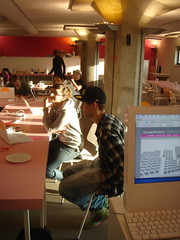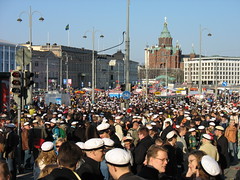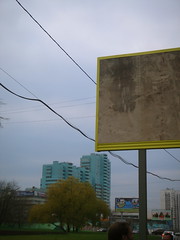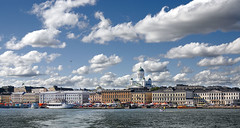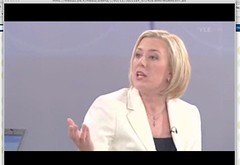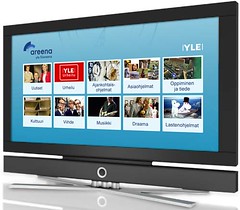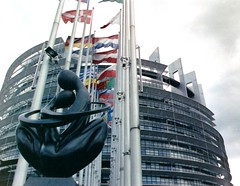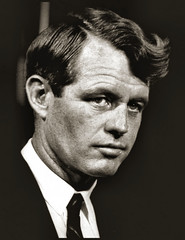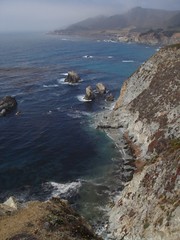Tuesday, December 30, 2008
Art of Language
My admiration for the gentle giant Fry re-emerged yesterday evening when watching Stephen Fry in America, a wonderful BBC series where the actor/writer/presenter travels through 50 American states with a black English taxi. The journey takes him from mansions of East Coast and hippy groups of the deserts to Thanksgiving celebrations in Deep South. The programme is entertaining while respecting the people who take time to show him their daily life.
His approach is something I truly love, not laughing at the common man but really making the effort to understand what drives people. So less Borat-meets-Michael-Moore and more Sir-David-Frost-meets-Oscar-Wilde. He makes fun of phenomena, not of the people and really lives up to his promise: understanding the American soul. He finds new stories of America and with his trip writes a new narrative of the great nation with a Can Do attitude.
My next Fry project will be the podcasts of him reading short stories of, indeed, Oscar Wilde.
Thursday, December 18, 2008
Right Move
In two days the van will head back to Finland. The boxes and bags are packed and tomorrow is my farewell party from work. Today I carried two bags of stuff home from the office. This evening when packing the last boxes, I was once again quite surprised by amount and sort of stuff I have collected in the last four years - seriously, 20 sorts of tea...
This video link from the one I am heading to is once again a proof that this is the right move now. Not that I would have doubted it for a second. Even the tough Nordic winter is bearable when you are surrounded by the ones you love and who love you right back. Christmas is a good time to return.
Sunday, December 14, 2008
Coolest Damn Video Festival on the Planet
We started StrangerFestival around two years ago on a couple of PowerPoint slides. Along the way came the visuals, the partner organisations, first videos uploaded on the site, first marketing material, more partners, more videos, an international festival and loads more. It is already a great project which has given loads of people their first time on a plane, their first video-making experience and their first international friendship.
This weekend we had a meeting first with our European partners and continued right away with the first meeting of TheStrangers, a group of young video makers acting as our expert group. Both of these meetings made it clear: this project belongs now to more people. It is not just our project. It is a bloody fab feeling when you start hearing more and more people using the word ´we´.
I am happy I get to continue in the project also next year, although in another role. Having these meetings in the beginning of the year would have made sense but then again TheStrangers group was really possible only after the first entries. It is fantastic that we can now learn from 2008 and make things better in 2009.
The people and issues we work with are amazing. Just a testing session on the website generated already a list of small things that would help make joining easier. You get to see some of them in the coming months. We came up with ideas for great workshops, created new categories, wrote down lists of possible jury members, brainstormed on prizes and even made some videos. TheStrangers showed us in the team and to each other already several videos which we had not seen before but which were winning material. It has now been proved that having young video makers owning the project with the team brings in great content. It is therefore clear now that in 2009 StrangerFestival will be even more special, even more fun and even more meaningful. I cannot wait.
Here are some of their findings:
Beautiful childhood memory from Slovakia
Role of video making in one´s life
How making a video important to you always does not need to be about you
Wednesday, December 10, 2008
Building Blocks
I was highly impressed by Stuart Hall, a British thinker I remember reading during my studies. Hall is one of the leading thinkers in the world when it comes to cultural diversity and very much deserved the award handed to him today. His short address to the crowd was very moving on the relationship of many immigrants to their place of origin as a place that does not offer comfort.
The programme stated that his speech would be commented by the Dutch Minister for European Affairs, Frans Timmermans. He very much impressed me with his clarity, his sophistication and his urge to build societies where the majority feels that newcomers do not threaten their belonging. Timmermans quoted well the old notion that if you build a society focusing on the fear of the barbarian, you end up creating a barbarian society without the barbarians. Valuable warning for the European project. It happens too often that ministers use these kinds of occasions for just arrogantly stating the importance of their own presence.
The event also proved that we can create and we need settings where sophisticated art and insightful thinking actually complement each other and where both are needed for making the argument. Thai dancer Pichet Klunchun and French choreographer Jerome Bel's dance performance Pichet Klunchun & Myself on understanding the essense of different traditions of dance and their relationship to their countries of origin was needed to cristallise Hall's speech on the importance of listening.
Moving, straight to the point and warm. Well done, European Cultural Foundation.
Monday, December 08, 2008
Moving Boxes, Moving On
I am glad that the move takes this form. Schiphol airport for me is a place that means short trips abroad. I know how it functions and it does not link to anything permanent. The car ride and the ferry make it concrete: time to move on, time for a change and most sadly, time to leave.
It is not yet clear what my days will be filled with from January onwards. I have sent papers for a company to the authorities and made some contacts but that is where we are. I have decided to allow myself to take some time to figure out what is the next step, what I want to do and what gives me the kicks. It is also essential to reserve time for the primary reason for packing these boxes: building a joint home and being closer to me family and friends.
With the risk of sounding to obamaesque, change feels good. Four years in one organisation is a long time. Having now the possibility to work for myself and focus on content generates a lot of excitement. After I made this decision to jump and start something new, I have not regretted it for a moment. I feel it is made for the right reason: not for the sake of leaving something but for the sake of wanting something.
Monday, December 01, 2008
Safe in the Hands of Visa
"This is XX from Nordea Bank. I am calling about your Visa card. I wanted to check a payment made yesterday. Did you make a purchase of 700 dollars in a department store in the United States?"
My heart started beating faster:"No..." I had flown from Amsterdam to Helsinki on the previous evening so making payments in the US would qualify me to play Superman in the next film.
"Sir, it seems that someone has gained access to your credit card information. We would recommend that we close the card immediately and we send you a new one. We apologise for the inconvenience."
I must say I was amazed. I have read numerous articles about credit card frauds but never thought it would hit on me. It occurred that two payments had already been done on my card.
But more than that, I was highly impressed by VISA. The friendly woman from Nordea explained to me that they have algorithms that monitor purchase patterns and the system had alerted that this payment was not in line with others. And what made the experience even more pleasant was that the woman from the bank was extremely friendly, assured me several times that I will only pay for the purchases I have made and wanted to make it work quickly that I would receive my new card. As I checked now online, my card has been blocked from Friday on.
These things happen, we don´t live in a risk-free society. But the more important fact here is that this experience makes me an even more committed Visa customer and stops my hesitation on changing into a MasterCard (promoted heavily from all directions). This is the competitive edge of today. Job well done.
Thursday, November 27, 2008
Tradition of Elite
This organization has been fundamental for our small nation in the North. It was the students of this very union who sang the national anthem for the first time when Finland was still under the Russian rule. It was also this very student union, which acted as the key stage in the cultural revolution of the late 1960s. 20 years ago HYY was one of the founders of Pakolaisapu, a legal counseling organization for refugees. This role taken by students is in no way unique for Finland – in the US students played a fundamental role in shaping the civil rights or anti-Viet Nam agenda.
It has been fours year since I attended these annual celebrations. This community has been crucial in shaping who I am now and how I carry myself to the future. It is not “just” some volunteering, it is a school of citizenship. I feel very strongly about its well being, at the same time recognizing that decisions are now made by people significantly younger than I am. And rightly so.
These parties provide us a peak into the mindset of their time. Selection of speakers and the songs being sung tell about the priorities and concerns.
This hope of acting as a beacon is of course an issue that the union needs to think of as part of its strategy in keeping students active in it: how much is the student union up to its time and promise of leadership? How does it keep itself fresh and alert? How is the student union showing the way of tomorrow for its nation? Which traditions are worth preserving and which are ones we have been doing for too long just out of a habit?
Relating to this challenge, I found myself thinking of the following yesterday evening: Singing is a great student tradition. But why students would sing in year 2008 mostly about boozing and even more troubling:”More land for Finland, more Finland on Earth, Let´s March to Carelia, Carelia!”
Wednesday, November 19, 2008
Echoes From The Diversity Chamber
It is no wonder that the European Union is busy with the subject. With all its languages and growing migration, Europe is going through a serious shakeup. A continent that built up the nation state is now struggling with it. Therefore the year 2008 has been announced to be the European Year of Intercultural Dialogue and a new slogan has been launched: united in diversity. It is difficult to find a politician who would not mention the magic words in an opening speech: intercultural dialogue. Having spent the last two days in a conference in Paris on the subject, this has also been empirically proven on local, national and EU level.
But there is a great risk in this rising interest. The more the phrase ‘intercultural dialogue’ is used without definitions or concrete proposals, the more it faces the risk of turning into a hollow phrase. When intercultural dialogue becomes the issue rather than a practical tool for mediation, the more it detaches from our daily lives. Intercultural dialogue is not something we experience, we experience interactions with other people and we deal with concrete differences of opinion. The last year has taught me that European politicians need serious training on storytelling and on touching also our emotional side next to the pragmatic one.
I cannot change someone’s values by banging them on the head with mine. If I express no sincere interest towards his or her positions and beliefs and do not recognize the difference, we just end up having a pretentious and shallow conversation. We need to focus less on compromise and more on comprehension. We need to dare to go on the level of goals and aspirations and stop with an obsession for instance on national/shared values. The core issue is what we do when we live together, not what we believe in. By being more explicit and detailed, we can also be tough on the ones that break the rules - regardless whether they are native or immigrant.
(This photo from the streets of Paris works well for this theme. Massive McDonalds rebranding campaign on all billboards in Paris saying: Come as you are.)
Friday, November 14, 2008
Ch-Ch-Change
There´s been a lot of talk about change during the last few weeks. We are seeing a new face of American leadership. As a friend of mine coined it perfectly yesterday:"It is not only Barack Obama. It is the view of seeing an African-American family walking on the stage with the American flag in the background."I could not agree with her more. I think a diverse set of leaders with diverse styles and aspirations opens possibilities for more people and is in the end better for us all.
On my flight to Helsinki last Wednesday I was reading the Newsweek special commemorative issue on Obama´s election. It made me shiver and moved me nearly to tears (no, it was not the KLM Pinot Grigio). On these moments I confess having jealousy towards the Americans: the boldness of top notch journalists to show emotion and excitement, to allow themselves to give a politician the chance to make that change.
I am engaging myself into big changes in my life. The first steps have been taken and I cannot tell you how good it feels. It means re-evaluating what you can, what you want and what makes you happy. Shaking up your personal dollhouse is bloody scary but it is something one ought to do every few years. And when you throw all the stuff on the table and prioritise them again with a fresh look, it leads to surprising result. More to follow.
Friday, November 07, 2008
This Is Who I Am
I was most impressed by the approach, which the presenter Saira Khan and many others had chosen. They defined themselves on stage before the audience had a chance to make their assumptions. They made the statement I would love to hear more often: this is who I am, I am not asking for any special treatment and I have no problem talking about my background - but allow me to do it on my terms. Saira Khan coined the issue well referring to her experience in The Apprentice TV show:"When the rules are the same, you get surprising results."
Personally and professionally the conference was a great inspiration for me. It gave me more confidence that we are doing things right in StrangerFestival: we allow the young video makers to choose what they talk about and what matters to them. We are all experts in our own lives and equality allows us to co-exist and share and feel part of something bigger. This does not mean shying away from differences, it means recognition of everyone´s right to define themselves. Diversity for us in StrangerFestival means that we strive for getting as different voices as possible from a diverse youth population, i.e. giving opportunities for more people and getting better content. In this manner we take a deliberate stand away from projects where minorities are invited to explain how different they are.
Way too often diversity is tackled on the level of an individual and not on the level of the system. Diversity needs to come in to the game in the recruitment phase and when negotiating the shared rules, not only in individual job interviews. As the speaker from IBM said in the Diversity Show:"If I would ever feel that I am promoted because of my cultural background and not my performance, I would leave. But the fact that I know the number of women and minorities in executive positions at IBM, means that someone is keeping score."
And as the last praise for yesterday, the great thing the Dutch public broadcasters had done was making a conference on diversity fun, visually incredible and good entertainment. I have often wondered why people who are able to do great programmes, are not able to translate their skills into making great events. Diversity Show built on competences from television in terms of length and formats of speeches, use of visuals and interaction amongst people. As EBU´s Head of Television Björn Erichsen put it yesterday: Diversity Show has set a new standard for European media conferences.
Tuesday, November 04, 2008
Just A Few Hours
"Our lives on this planet are too short, the work to be done is too great. But we can perhaps remember, that those who live with us are our brothers, that they share with us the same short moment of life that they seek as do we, nothing but the chance to live out their lives in purpose and in happiness, surely this bond of common fate, this bond of common roles can begin to teach us something, that we can begin to work a little harder, to become in our hearts brothers and countrymen once again."
- Senator, Presidential Candidate Robert F. Kennedy at the City Club of Cleveland
Cleveland, Ohio (5 April 1968)
Sunday, November 02, 2008
My Name Is Moscow
And this is only the people who choose for public transport. In the information pack from the British Council they instruct us to head to the airport four hours before departure. It seems absurd but already on the way into the city upon arrival it starts making sense. Two hours moving on snail speed for something like 20 kilometres.
During a presentation by a young architectural office we see fancy designs for gated communities and ski slopes on the rooftops of shopping centres. One of them looks a lot like Rem Koolhaas´ star architecture in China. The smooth PowerPoint presentation makes me think of the demand by lecturer Roy van Dalm: a future plan of a city needs to be authentic, it needs to link to the city´s DNA.
We cannot all become Bilbao or Amsterdam. It is not the right answer for the struggles of Moscow to copy an internationally famous architectural plan when the city is barely coping with its amount of traffic and the thousands of homeless people. Copying others results only into being a second-rate version. An answer to Moscow´s challenging is not starting from scratch, it is seeing how people can start imagining a new sense of being together building on the history of the city. In other words, how Moscow can become a better Moscow. In order to build a community, you need to give citizens the possibility to continue and enhance their individual experience of Moscow.
I would not trust governments to come up with this new imagination. I have seen two many cities proclaiming themselves as the creative capital. But I do feel that you need artistic and activist interventions to stimulate seeing common things in a quirky manner. You need positive engagement and a bit of silliness even in a form of a apartment block bingo or guerilla gardening. This does not mean wasting a lot of money on star architects, it means change in the IKEA style: giving people affordable access to imagination stimulates them to start experimenting with new looks and feelings. Moscow needs the attitude of guerilla gardener Richard Reynolds: I can do this too. I can change Moscow.
Monday, October 27, 2008
Few Steps Away From The Left
The centre-right party National Coalition (Kokoomus) is the winner of the elections being for the first time in Finland´s history the biggest party on the municipal level nation-wide. They even managed to pass the Social Democrats in Vantaa, a traditionally strongly leftish city next to Helsinki. Kokoomus is growing its alliance amongst Finns, which I hope means moving even more strongly towards liberalism also socially.
The Greens beat the Social Democrats with clear numbers in Helsinki and became only for the second time in history the second biggest party of the capital. I hope this means more investments in services, in public transport and urban planning. Traffic policy is the big issue where Kokoomus and the Greens will most likely be bolstering their muscles against each other in the course of the next four years.
Nationally the biggest winner of the elections is the populist True Finns growing their seat number nationally with 336 seats. They have clearly marked their place as a serious contestant for the votes of the working class and the unemployed with a xenophobic message. This truly worries me even if one could seek for some consolation from the fact that the rise of the populist right is a pan-European phenomenon. I understand the fear of insecurity that the True Finns tap into but in times like these we really see what kind of a wonderful safety net the EU and the euro are for us. The responsibility of the other parties is not to ignore the True Finns but to take them on their message and reveal the weakness of their rhetoric. It is however yet difficult to make any prognosis what their support will result to apart from offensive language.
The Social Democrats came down in the elections with rocket speed. Their populism did not work in this economic situation with factories being closed down across the country. I feel most Finns understand that it is time to save, not to demand more for free. Only in Helsinki they lost nearly 12.000 votes mostly going to the Greens and True Finns. The fall especially in Helsinki was harder than anyone expected. It only continues the long list of evidence on the crisis of European Left. Chairperson Urpilainen´s strategy of claiming her party to be part of the centre can be questioned - at least the voters were not energised by it. Taking the position of the conservative and stubborn defender of the Nordic welfare state (which they claim to be their creation) is not a very aspirational campaign message.
In other parts of the country the results also show difficulties for the Centre Party, traditionally the biggest party on local level and also in the last parliament elections. The success of Kokoomus is mostly due to the problems of the Centre Party. The position of Prime Minister Vanhanen as the party leader is significantly weakened for instance by the poor results in Lapland - Centre Party lost there 8 % of their votes from 2004 meaning over 6 000 votes. It is interesting to see how the price of being in government is only paid in these elections by the Centre Party.
Friday, October 24, 2008
Out of Touch
The weakest from the debaters based on my judgement were the leader of the Greens Tarja Cronberg, leader of the Centre Party Matti Vanhanen and leader of the Social Democrats Jutta Urpilainen. Minister of Labour Cronberg spoke twice in the first hour and is not able to push forward the Green agenda on services and quality of life. She tries to balance urban life and rural areas but gets somewhat confused with all the aspects. She becomes a voice of the government rather than representing the Greens in local politics although she improves her performance towards the end. Prime Minister Vanhanen's problems are somewhat alike. As Prime Minister he seems to act like he would be somewhat above the others and ends up coming across as smug and arrogant and not willing to take any criticism. Opposition leader Urpilainen however falls into the trap of populism. She is not able to answer questions on how Social Democrats would fund their "more, more, more" agenda. Urpilainen also gets unfortunately agitated when pushed into the corner with tough questions.
The winners of the debate are the populist True Finns and the centre liberal National Coalition. They get their ideological message across (True Finns about defenfing the small man and National Coalition on balancing costs and income). Leader of the National Coalition, Minister of Finance Jyrki Katainen manages to stay calm and push through the message that the current government has invested in municipalities. Leader of the centre-right Swedish People's Party, Minister of Culture Stefan Wallin manages also to be clear and talk about caring and climate change.
But the key problem is not between people, it is in the nature of the debate. The most absurd moment was the discussion over a recent poll where 62 % of respondents think that politicians can be bought in urban planning decisions. The reaction of the Party Secretary Jarmo Korhonen:"No Finnish politician can be bought. I know." That's the way Finnish dialogue works.
Overall the discussion stays in concepts only familiar to politicians and very seldom looks into the position of the individual in the changes. Dear leaders, no one uses words such as structure and resource in normal language. It enforces the idea that in order to take part in politics, you need to learn a new language.
Tuesday, October 21, 2008
This Is What This Election Is About
Colin Powell endorsed Barack Obama last Sunday, which was a major blow for the Republicans. Out of the entire interview, this reasoning touches me. This is why they should vote Obama.
Added later the same day: And what I was trying to point out, the phenomenal New York Times columnist Maureen Dowd puts down in the way that only she can. Thanks for the tip, Mr Minnesota.
Monday, October 20, 2008
Printed Element of Surprise
A clear example of this wonderful quality of newspapers was the Guardian of last Friday, which I picked up on my way to a lunch on my free day. While eating my sandwich, I glanced through the news section. Before I got halfway, I threw the newspaper into my gym bag. I bumped into it again on my lazy Sunday and found myself getting completely excited by a big article on the Qur´an. Madeleine Bunting´s and Ziauddin Sardar´s debate on interpretation of the holy book actually taught me new things. Sardar´s radical position of trying to read the Qur´an in a straight forward way, without the historical load really fascinated me.
"For me the Qur´an is a living, dynamic book", Sardar wrote. "This is not just a definition of a believer. It is also a statement about belief...So, with new determination, I say that we Muslims have to teach ourselves to read and think about the Qur´an without the weight of tradition and classical commentaries. Muslim scholars and experts should not exist as gatekeepers, permanently excluding us from using our knowledge and insight to make sense of the Qur´an for ourselves."
Through what kind of Google search would I ever bump into this?
Sunday, October 19, 2008
Sunday
This is very close to being the perfect Sunday song. The amazing Duffy with Jools Holland. There is just nothing that beats a BIG orchestration. The encouragement to love again, to be bold and hopeful even if it seems very difficult is one amazing message. The stubbornness and daring for the pursuit of happiness. That sometimes it means that you make some drastic moves in your life, which may hurt in the beginning in order to gain the well-being that in the end counts. These moves may be about relationships like in the case of the song or about the other main components in our lives such as housing, work and so forth.
I hope this is not only Sunday talking inside me.
Tuesday, October 14, 2008
Monday, October 13, 2008
Old Boys' Club Challenged
The professors and retired politicians are annoyed that Stubb is opening up the diplomatic circle by allowing the daily Helsingin Sanomat to publish assesments of Finnish ambassadors on the status of world politics. Stubb asked these reports following the Georgian conflict and then decided to allow the main daily to publish some of them anonymously.
I read the article based on the reports. There is nothing shocking. The diplomats are divided between more skeptic and more optimistic ones when it comes to Russian relations with the European Union. Some express doubts on the future of the United Nations as a conflict mediator. Some use a bit livelier language such as:
"Finland needs to decrease its dependency on Russian energy. This should be done gradually and quietly, not in a demonstrating manner by fearmongering on the Russian threat. But it needs to be done. The US Marines have a saying:''If you grab them by the balls, their hearts and minds will follow'. i presume the Russian know the proverb too."
So let's get this straight. The Minister paid by us asked civil servants paid by us to assess global politics and then the minister decided to share these reports with us without sharing the names of the ambassadors. Former foreign minister Paasio wonders whether this leads to people thinking twice before telling things to Finnish diplomats. Some of the other commentators have been wondering what it does to our international reputation when diplomats drift away from the country's policy. Come on. Anonymous and differing reports from different corners of the world lead at least in my thinking to greater respect towards the men and women in our diplomatic service. What is better service to the people than allowing us to understand what are the cross currents guiding our foreign policy? I cannot help thinking that it works for some people's benefit to keep up the image that foreign policy is super secretive and not meant for the Joe on the street to understand.
Thursday, October 09, 2008
Going all ARTE
Just found this video from YouTube by googling StrangerFestival where they interviewed both me and the maker of one of my favourite videos from the competition. Should have worked on my German a bit more in school.
Wednesday, October 08, 2008
The Troubles
An innocent question in a discussion between Finnish secondary school students and President Halonen earlier this year on the Finnish civil war led to an unsurprising reaction from the President. She hesitated for a moment, clearly felt uncomfortable to answer and finally said:"red rebellion". Halonen´s reaction to events long before she was born showed how deep the civil war is still especially in the generation of my parents. How it is still, in 2008, more or less leading the list of things people don´t want to talk about.
The small article in Helsingin Sanomat earlier this year describing this moment popped into my mind tonight when listening to Kjell Westö talking about his book Missä kuljimme kerran - one of the most widely read Finnish novels of the last 10 years. The book describing the generation born around 1900 has now been translated into Dutch and Westö was visiting the Finnish Embassy for that occasion. He shared with an audience a comment he heard, which describes to a large extent still the attitude of Finns to the tragic events of 1918 where according to some estimates 37.000 people lost their lives:"We have not discussed that for 100 years and we are definitely not going to start now."
Westö´s book is an important book for me. It helped me understand what my grandparents have gone through, what was the world my parents were born into and why the Finnish identity is the way it is. It also helped me start a discussion with my older relatives on the time before I was born. Westö said tonight beautifully that with his books he attempts to help the audience to remember that there were people on these streets before. He also reminded the audience that even when language played a big issue in the civil war, there were Swedish-speaking and Finnish-speaking people on both sides. The histories of people are more complicated than we often allow ourselves to realise.
I always thought that the tragic incidents of 1918 as well as 1939-1945 are issues that I can talk about with an open and critical mind. I mean I had no part in them. This was until 2004 when in a New York subway an American lady in her 60s asked me and my friends in the middle of a casual conversation:"I just wanted to check. During The War, which side were you on? On our side or the other side?" That uncomfortable feeling of shame, that sudden sweat and the blushing caught us all by surprise. We stuttered and it took us a lot of time to deliver an answer. Maybe Westö was right today when he said that it takes 6 generations before a war turns into another historical event.
Tuesday, October 07, 2008
We The Republic
And all this with just a click - for free. And we even got into The Guardian.
Monday, October 06, 2008
Logistics of Aspiration
And then there is the London that you only see when you spend time with people who live here. It is those wonderful cafes, those phenomenal people in those lunch parties, its that ambition you catch when you talk to people about their future. Its drinking that last gin tonic at that upstairs bar too late in the evening and biting into that home-made pakora at that cosy kitchen table. Its those discussions ranging from religion in public life to the differences between X Box and Playstation.
And as a journalist this still is the heaven for me in terms of reading. Walking to that newsstand and with only a few pounds accessing the best writing of today. I always come back with lists of books to buy and clippings of superb articles.
And then, yes, then there is the transport. Its that Jubilee Line stopping between stations for 25 minutes, the Circle Line terminating two stations too early, that bus taking ages in crossing the Thames, sweating through those stinking and boiling hot transfer tunnels and that smell of urine from your fellow passenger. Living in Amsterdam I guess makes you into a spoiled brat but spending 90 minutes underground in reaching your destination is not really something that I would see myself doing every morning. It gives you time to read books though.
Now time for bed, tomorrow we are releasing some good thinking.
Wednesday, October 01, 2008
The Video Republic
On Monday we launch together with Demos a report on youth and video which has been carried out associated to StrangerFestival. From Monday 6 October the report is available for downloading at www.demos.co.uk. I highly recommend reading it. But here as a taster, a video building up the excitement. The report is funded by Helsingin Sanomat Foundation.
Tuesday, September 30, 2008
Kid, Young, Youngish, Aging
Next to the few jokes made about the age issue, for a moment it threw me off rails. To be exact, my own surprised reaction was more troubling than the age difference. What’s in an age?
I have often been in situations where I am the youngest person and I have found people addressing me in a highly condescending manner. I could list numerous examples where I have got upset by comments such as “oh, you will understand when you are my age’ or ‘you young people’. I just have zero tolerance towards using age difference as a lifeline out of a professional debate. But the dinner last week made me wonder whether I have now gone full circle and started addressing people in a manner that I would not tolerate for a second. Why on earth would it change my approach that there is seven years between me and a colleague?
Due to my work I use the phrase young people several times a day. I use it in discussions, advocacy work, articles and funding applications. But I sincerely hope that last week, I catched myself early enough. I do not want to be that person who looks down on young people with that irritating amusement on their face. I really wish I can be a person who listens without prejudice, who makes judgements based on arguments and who is willing to explain their position to both young and old.
But I also want to recognize that I am getting older. I acknowledge that there are things that just go beyond my taste, my judgement and my understanding. But I wish I can live up to Robert Kennedy’s notion of qualities of youth: "not a time of life but a state of mind, a temper of the will, a quality of the imagination, a predominance of courage over timidity, of the appetite for adventure over the love of ease."
Wednesday, September 24, 2008
Making Sense
So what else did I grab from today?
- Google is not very good - some even said crap - in suggestings things to us that we were not aware that we are interested in (like for instance newspapers are)
- nearly all creativity requires collaboration but not all collaboration is creative
- "free form internet is a pure myth"
- Aaron Koblin's work on visualising data is amazing (see video above on visualising SMS sending in Amsterdam)
- internet platforms have corrupted the way we use the word friend and the meanings we give to it.
By the way: PICNIC is doing a huge mapping on trends. If you can think of one, let me know by giving a short explanation and an example and I will add it to the mapping exercise they are doing. One I saw added today was sharing rare music via YouTube.
Sunday, September 21, 2008
Prisoners of Broadcasting
a) the seminar gathered all the Finnish big shots in Finnish media
b) the discussion turned very heated when some commercial actors threw punches on YLE, the national public broadcaster
Helsingin Sanomat Foundation picked the subject at a convenient time (and the newspaper continued stirring things in today's paper). YLE has gone threw some rocky waters over the last year with license fee income dropping dramatically, YLE signing an exclusive deal with the American HBO channel and the energetic CEO changing people, reducing staff and increasing subcontracting. But at the same time YLE has grown its market share and is still by far the most trusted news broadcaster. YLE’s turmoil has not been helped by the gossip journalism around the CEO’s private life.
The discussion was bizarre and then again not. When anyone raises discussion around public services, the social democratic jargon kicks in and people start referring to democracy and minorities in a conveniently blurry manner that makes it difficult for the opposite side to continue. Personally I found it a shame – as a supporter of quality public broadcasting - that the argument by many of the defenders of YLE was more or less the following: we need YLE because YLE is needed because YLE provides crucial services and because YLE plays a key role in building a democratic welfare state and because politicians want support the system. This circle argument avoids all specification and making choices.
Even if it would save you in a panel, this argumentation is bad for YLE in the long run. It disregards the problems YLE has in reaching out to younger audiences but also the quality work that is done at YLE in the fields of Finnish drama, culture and current affairs. But I feel the problems go even deeper.
The roles of public broadcasters are currently outlined as educating, informing and entertaining. All these tasks allow the audience to do is the take the message in, enjoy and learn. They exclude all interactive tasks and are by and large the reason why young audiences are zapping to other channels. With the technology and resources public broadcasters have, they could do much better. One could try and let some air into the tasks and think for instance of words like empower, represent, mobilize, voice out, help and encourage. But this would mean radical changes such as opening the conglomerates called YLE, listening to the audiences more, doing programmes in collaboration with stakeholders and acting as a guide through user-generated content.
All and all, I remain a firm supporter of public service media. But I am not sure about the broadcasting.
Wednesday, September 17, 2008
Switch
---
During my summer holiday I read a great book by a Finnish young philosopher called Tommi Uschanov. The pamphlet by this quite peculiar character is called What is the matter with the Left. In this book that he had apparently been working on for more than six years he wondered why the European left is doing so badly when most of us buy their values of solidarity and compassion nearly to the full. What Uschanov wrote about the Left’s thinking I feel links well to the subject of this intervention. Uschanov claimed that an overall problem of European social democracy has been to tell people that their understanding of themselves and their priorities is wrong and that only if they would understand that they live on false premises, the society would function better. This was very visible in the 1970s idea in the Nordic countries that there is a Social Democrat in all of us.
In my work with young people – once again I wish to stress that I am not part of this group – I meet engaged and worried young people. These people are busy with a million things at the same time on a personal and local scale. The young video makers and fashion designers I meet also seem to be extremely allergic to fake things. If I was asked to describe the generation just shortly, I would dare to state that their jargon tolerance is the lowest of all generations I know. I see people driven by real emotions, real actions and real skills, not by big ideas, great achievements and global movements.
I think this is where it somewhat goes wrong for Europe. When a generation of personal action is coupled with ambitious ideologies, they detach from each other quickly like oil and water. The message being pushed is about big things such as peace and prosperity where people want a role, they want a genuine feeling and they want an emotion. The question I hear is: what should I do with Europe and what does Europe expect me to do? I really don’t have a compelling answer based on the current paradigms.
In the videos I see online on our projects but also on platforms like YouTube, the majority of the videos are not making explicit statements about the state of the world. They are more saying “this is how I think I am feeling today” or “this is what I think matters to me today”. As a research commissioned by the ECF around the StrangerFestival points out, young people use video for deliberation and they very seldom make their work for a specific audience. Video is in most cases a public tool for self exploration.
A superstructure like Europe is not an issue tackled often when it is nothing you can touch, nothing you can strive for and nothing you can influence in your daily practice. Just as an example we can take last year when the European Union celebrated the 50th anniversary of the Treaty of Rome. The message put forward was 50 years of peace. A lot of references were made also to the fall of the Berlin Wall and the progress Europe have made since then. I could not help wondering what this all should mean for an 18-year-old today who was minus 32 when the treaty of Rome was signed and just about born when the wall was hammered down. 50 years of peace and now what? When Europe seems to be a deteriorating mega project, it is very difficult to get excited.
Coming back to Uschanov, I feel we need a switch in our thinking. Young people are not stupid and don’t buy Europe when you attach a popstar to it. Europe needs to be demystified and it needs to start from people’s realities. What this video culture offers us, is this pool of deliberations for us to dive into. Now what we are mostly doing is asking them to adjust their reality to a supersystem without no practical implications.
So what could be done? I would have two suggestions:
1. Provide access for more young people. If we want to see a Europe that goes to the skin and feels like something, we need to make sure that more people are involved. With this I mean work that we do for instance with theoneminutesjr by providing access to culture, supporting self-esteem to enter the public sphere and in that sense tackling the symbolic inequality in the public sphere created mostly by white heterosexual men. But we need to allow people to decide what matters to them, which brings me to my second point.
2. And this is more difficult: We need to support connections and curation and help people – both young and old – to make sense and find their place. We need to build links between strangers but on matters that matter to them. This does not mean that people need to agree but we need to work towards exposing commonalities in interest. We need to allow people – young and old - to test, modify and attach rather than buy a message about a superproject. When you start from something that matters to the people, you are already more than half way there. And when these millions of expressive people with millions of aspirations happen to be in Lisbon, Pieksämäki and Cluj, I bet there is a feeling of being part of something bigger than our own village. I really think free self-expression is the key: if I matter to Europe, Europe could matter to me.
Monday, September 15, 2008
Fierce TV
The latest podcast was with Lauren Zalaznick, the Director of the Bravo TV channel, and Tim Gunn and Gail Simmons from their programmes. Tim Gunn is the coach in Project Runway, I believe the biggest hit of the channel. Simmons is a judge from Top Chef.
I highly recommend listening to the podcast. Zalaznick sheds light to the way their programmes differ from normal "intervention" reality television and how the changes in television threaten the dominance of the big networks. Zalaznick talks about how Bravo bases its programming on excellence, professionals and people driven by a desire - whether fashion or comedy. Gunn and Simmons talk about how their programmes helps people to understand professionalism and talk in a new way about food and fashion.
I like Bravo, I really do. I watched quite a lot of it while on holiday in the US. The channel is genuinely feel good and free from cynicism. It is about fascinating people doing the only thing they can see themselves doing - great example being Kathy Griffin and her show My Life on the D-List.
Bravo is a good example of clever programming and profiling. It caters for a diverse audience but still manages to put a Bravo label on the programmes. It is not trying to be the most intellectual channel but manages to bring very different people together.
The interview is also a clever example of dedication to understand television. It is a rare example of printed journalism where the journalist actually want to understand television and dares to say she loves television. Highly recommended (easily subscribed through iTunes).
Wednesday, September 10, 2008
Finland Lived From The Forest
But the tragedy does not end here. When an IT-company fires people in the capital region, the employees have still a big sea for job-hunting. But when an industry such as paper and carton closes down a unit, they by and large close down a town. In towns like Kainuu, Valkeakoski and Imatra more or less the whole community is linked to the unit. What starts with the factory workers, will be soon knocking on the doors of shop keepers, sub contractors and truck drivers. Social workers have a busy time ahead.
The most grotesque side of things is how capitalism works in these situations. The stocks bounce up in record-breaking numbers and the analysts congratulate the management for their boldness. For the paper worker with a big mortgage in Imatra it must be like kicking the one already down.
Monday, September 08, 2008
Responsible Visuals
I love those chats that you cycle to with strategy X and you realise after 30 seconds that this is going to be much more interesting. I met today with Eboman who performed at StrangerFestival´s opening. We discussed possibilities for working together. I expected to hear a lot about technology that I do not and will not understand and ended in a discussion on privacy and civility.
We discussed an idea which will be featured in the up-coming DEMOS report as well: the role of remixing and sampling in giving people tools for self-expression. As Eboman´s work shows, creative use of existing content gives him more tools as an artist. We were brainstorming on equipping young people, NGOs and what have you with better and easier tools for visual interaction, self-reflection and social commentary. I think we need to tackle this issue for different directions: when Eboman comes from the media arts corner, for instance Tactical Tech are doing their share from their corner.
Some people mentioned after Eboman´s performance at StrangerFestival that they were concerned about using intimate and sensitive material for sampling. I felt a bit awkward mentioning this to him today but the response was very different than I would have expected: as an information activist he was not taken back and stressed the role of these kind of examples in fostering debate on what we should put online, how others can use our material and what are the "houserules" of sampling.
As I cycled home, this Monday had turned much better than expected. I really felt inspired by developing ways for StrangerFestival to be in the frontline in equipping people with better tools for social visual literacy and commentary.
Friday, September 05, 2008
Microwave Dish
Uschanov is not alone with this confusion and disappointment. So are the voters. One should have spent the last decade in a barrel to not notice how Social Democrats lose elections in Denmark, Sweden, Finland, Italy,… - list could be continued forever. At the same time the French Socialists lose the presidency to Sarkozy, Finnish big cities are governed more and more by Conservative mayors, Boris Johnson rules over London and Angela Merkel leads the coalition government of Germany.
In most countries the Left – once the defender of the working man and international solidarity – has become a machine led by middle-aged pompous men, heavily linked to trade unions (also led by pompous middle-aged men), an advocate of nuclear power and the biggest anti-globalisation movement. The former leaders of the “party of the people” turn into lobbyists for multinational energy corporations. The party that marched people in their early 30s into ministers in the 1970s is now the (only) movement having a City Council group in Helsinki with the average age of 60.
It is true that many issues such as workers´ rights are achievements of the Social Democrats´s struggle but over the last years the Social Democrats have become the Conservative Establishment – the ones with their foot on the break against change - of many European countries.
It seems like the Social Democrats by and large are out of batteries. In Finland I was reading interviews with the new leader of the Finnish Social Democrats, a woman of my age. Jutta Urpilainen´s mission was to take her party to the centre of the political field, get more active on climate change, invest in families, consult people across the country and attach the word “new” in front of the name of her party. It was somehow disappointing to see that all the ideas are luke-warm copies of concepts executed by others 10 years ago. Becoming like everyone else is not the best exercise for better branding. Everything she was trying to offer as new felt pre-chewed, pre-cooked and recycled.
They say that one needs a real crisis in order for new ideas to emerge. But for Marx´s sake, how long does this take to have again a cool, up-to-beat, engaged and passionate left? Even as someone not being a Social Democrat, I miss decent action and debate.
Tuesday, September 02, 2008
Scary Little Thing Called Hope
I admire RFK for his peculiarity and strength in idealism. He is characterised as a shy and slightly awkward person with a tendency to come across as arrogant. In his earlier years he made some drastic mistakes in his career such as approving the wiretapping of Martin Luther King but he did not allow this to stop him from changing course. As he beautifully explained his U-turn in terms of agenda when running for president, a previous misjudgement is no excuse for its continuation. He dared to be human, show emotions and admit having been wrong.
I am still most struck by the way he was moved by seeing people suffering, which often led him manically talking about the living conditions of African Americans in the Mississippi Delta or Native Americans in the reservations. He dared to step outside the normal "on the other hand" language and used words like immoral, right and wrong. According to his staff and the people who met him, Kennedy had an exceptional capacity to understand people´s conditions and see himself living in the same situation. He was driven into anger by the injustice and poverty within the United States, which led him to step on many toes, make unneccessary enemies and act in haste. He talked often about the equality of sacrifice if America wants to become truly one nation. This was for instance the reason why he was against freeing college students from Vietnam drafts. He explained his position simply on this issue as well in moral terms.
What makes him even more fascinating is that he was no softy social democrat when it came to politics. He always saw work-based assistance as the best way for people to lift themselves and their families out of poverty with still keeping their dignity. In the same way he had zero tolerance towards lawlessness - whether carried out by the ones oppressing or being oppressed.
When reading the descriptions of the emotions he generated especially in the African American and Latino communities, I find myself wondering how wonderful but scary hope is when it is truly released. People saw Kennedy as the man who could change things to an extent that threatened his life, made him lose shoes and shirts while making his way through crowds and made the establishment extremely worried. He was giving people a role and seeing them as the ones needed to change the course of America. As many of his opponents said in 1968, they were afraid of RFK as he was seen as someone who really would carry out his ideas on redistribution of wealth.
One only wonders what the world would be today if this man would have lived to be president and could have executed his dream of "taming the savageness of man and making gentle the life of this world." And why we have never seen a leader of his league after that.
Thursday, August 28, 2008
Phoenix Bill
I don´t know what they were thinking. Bill Clinton is one of the most skilled political animals of the last few decades. He wants to win at all cost. He in many ways was the inspiration of Tony Blair and the famous Third Way. He charms people young and old. He can make you feel like he is talking only to you. His campaign ads from are iconic pieces of political TV campaigning. I have watched it several times and it still makes me choke.
His speech yesterday was honest, funny, witty and on the mark. Clinton managed to keep his voice normal against the roaring crowd and did not shout like most other speakers. He recognised the hard battle, confessed that his candidate did not win but threw his support behind Obama with emotion not yet seen at this convention. He was clear in giving reasons why we need Obama. He did not repeat what others had said. He tactically reminded the crowd of his own achievements without sounding smug. By looking at the faces and reactions of the delegates, it was obvious: King Bill is back.
Monday, August 25, 2008
Efficient Holidays
I mean it has been a fantastic holiday. We have done a lot and been to zillion places. But i remember a situation from the hotel pool in Las Vegas where I was told that my behaviour gives reason to believe that I have AD/HD. I am bored within 20 minutes at a pool. I find myself carrying a book, the iPod and a pile of magazines with me to kill the time. And before long, I had to get up, walk around the pool, check the cabana shop, buy the newspaper and dive into the world of global politics. I was told that this gives reason for concern. Only the overpriced Internet connection kept me away from updating the Facebook status. How sad.
I do understand now why a lot of people decide to spend their holidays in places without proper Internet connections and where using your mobile phone is ridiculously expensive. It is a useful but painful exercise to detach and admit that the world keeps on spinning and things don´t immediately fall into pieces when you are away for a bit.
Tuesday, August 19, 2008
Refreshing Honesty
With a strong academic background, fluency in several European languages, marriage to a non-Finn, openly liberal agenda in both economics and values as well as a background in the European Commission and Parliament, he must be the most European politician Finland has to offer. He manages to surprise people by daring to enter policy areas such as rights for sexual minorities which are usually considered minefields within his (still rather conservative) party. During his time in the European Parliament he took strong stands on LGBT issues as according to Stubb, human rights are where the European Union is tested. It shows boldness to step outside the comfort zone.
This civil servant-turned-politician is immensely popular within his own party as well as outside although he gets a decent amount of mockery for his athletic hobbies, big and white teeth and the un-Finnish strong tan. He is to some extent a dandy combined with substance. My favourite part of Stubb, however, is his frankness in language and action.
It seems Stubb has no need to prove things to anyone. First of all, he seems to avoid official and formal language and prefers spoken language even when talking about policy issues. He dares to say things like they are and blogs daily which has raised some eye brows within civil service. Some people think that Foreign Minister should not open his personal life and daily activities to the people in such extent. I disagree.
Last weekend Stubb pushed his head into a beehive rather delicate for small nations like ours. We Finns tend to love every time a foreign politician mentions us and we tend to exaggerate our role in global politics. Finns like to maintain the cold war reputation of being a key mediator between East and West. As a Chair of the OSCE, Finland and Stubb have been involved in the Georgia-Russia negotiations which was covered in Finnish media as Finland´s neutrality being a key asset in the negotiations. Stubb responded with great irritation saying that he thinks this kind of nonsense is not needed in this century. He said bluntly that Finland´s neutrality was not the key, it was France´s role as a nuclear power and as a permanent member of the UN security council.
I admire Stubb for this. It shows an attitude which encourages also others towards honesty and sincerity. I admire his boldness to be openly who he is and allowing himself to break stereotypes of what men in expensive suits should be interested in. In a way it is the same uncommon combination as the Kennedys who never hid their privileged background but never allowed that to stand in the way of taking bold stands and getting passionately involved.
Sunday, August 17, 2008
World's Toughest Springboard
I cannot help being blown away by America. Every visit makes me love it more and simultaneously leaves me more and more confused. I am realising ever clearer thatwe should not pretend like our lifestyles would be similar. Where Europe is safe and cosy, America is radical in its ups and downs - on the individual, local and national level. No European economy goes up and down like theirs and no European nation state contains the same diversity as the US. The New York Times featured earlier this week a research that by 2043 minorities will form the majority of the US population.
But simultaneously no European state is as divided as the United States. Visit to Chicago and California makes everyone race conscious, whether you want it or not. As novelist James Frey puts it in today's Financial Times:"I think Los Angeles is a city that embodies contemporary US society. It's segmented and divided, rich and poor. It's the American dream in its purest form, whether you're there searching for a roof over for your head or for international stardom." It's no place for cowards, America is still in many ways a cowboy's playground.
It is not a coincidence that in affluent areas of big American cities African Americans and Hispanics could be seen largely only behind the coffeeshop counter or cleaning the hotel rooms. United States is a diverse society which does not mean yet that it would be a mixed or equal society. Recent study showed that only 1/70 of children are born into black-white families. Mixed families or circles of friends tend to be still the rare incident proving the rule right.
But beyond all these things, like James, Frey, I have been seduced by the American Dream. People still believe in the power of the individual to make it. They believe in their possibilities to provide happiness and affluence to themself and their family. In that Californian living room I heard no comments about giving up. Everyone I talked with over the last three weeks said the same: it will spring back up, it just takes some time. It's this relentless optimism that leaves me energised. It is what James Frey captures in his fantastic book Bright Shiny Morning: no one claims America is living up to its promise for all but the dream keeps the springboard swinging, and millions of people reaching out for that happiness.
Saturday, August 16, 2008
Rock-o-bama
"We are the ones we've been waiting for." That is one damn beautiful sentence.
Let´s Get Going
New video from Moveon.org covered in all political talk shows here in the US yesterday.
Wednesday, August 13, 2008
Rich California
I am writing this post on a slow and run-down dinosaur called an Amtrak train. Even with magnificent views, the train is a strong example how the American government has consciously ran down its public transport system. The train is already an hour late and takes twice the time the same distance would take by car. But that does not really matter now – summer holiday is not about timetables.
Over the last few days we drove from San Francisco to San Luis Obispo down the Pacific Coast Highway. The road winds down the coastline and takes you to beautiful smaller cities such as Pescadero, San Luis Obispo and Monterey. You can actually opt out on McDonald’s and visit an 89-year-long family-owned grocery store instead. The drive shows you the richness of California beyond Hummers and bling bling. You see redwood forests changing into neat rows of palm trees, sea lions and pelicans as your soundtrack, vast deserts and blooming artichoke fields, the grass and bushes destroyed by the recent fires, sea going through all shades of blue, thick San Francisco fog making way for blue skies and the steep cliffs fighting with the sea for their existence. You drive down that road, ocean all the way to Japan on your right and the entire North American continent on your left. It is not a word we Europeans use very often: awesome.

